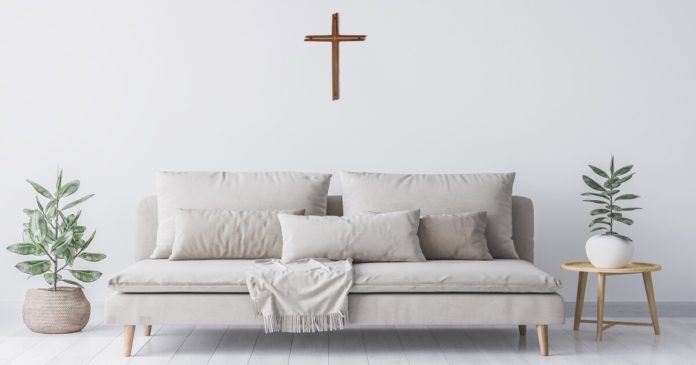Decluttering, tidying, organization: Whatever it’s called, the trend toward minimalism has many American families committing to owning fewer things, buying less stuff, and living more simply.
The minimalist spirit is evident everywhere: TV stars Joanna and Chip Gaines offer fixer-upper advice to couples seeking to downsize. Pinterest pages contain countless tips on household decluttering. And each promotes efficient organization to help families save money, make their homes and offices clean and efficient, and streamline out-of-control schedules.
Many individuals striving to live simple, more meaningful lives find that minimalism and spirituality go hand in hand. Indeed, those who practice faith traditions such as Buddhism, Hinduism and Shintoism have for centuries known that relinquishing the desire for material objects instills their lives with higher purpose.
Today, faithful Christians are discovering that minimalism also embodies New Testament teachings, specifically Christ’s warnings to the wealthy about the dangers of attachment to worldly possessions. It is no wonder, then, that a handful of YouTubers and bloggers incorporate minimalism with spirituality and some professional organizers incorporate prayer into their work.
One of the first Christians to publicly embrace downsizing, organization, and the adoption of a simpler lifestyle — along with a plan to accomplish it — was Marla Cilley.
When she became overwhelmed with her house-and-home responsibilities, Cilley in 1999 developed a comprehensive cleaning and organization plan now known worldwide as the FLYLady system. FLY stands for Finally Loving Yourself, her advice to the overwhelmed.
“People have always wanted to be more organized,” says Cilley, who lives in North Carolina (the FLY in FLYLady also stems from her love of fly fishing). Her step-by-step guide — detailed on her website, flylady.net — breaks housekeeping tasks into manageable chunks and the home into several zones.
Cilley almost immediately sensed the connection between an organized home and her faith.
“I believe that the chaos in our homes is a tool … to keep us separated from God,” she says. “Putting out fires, stacks of bills that aren’t paid, a messy house — it makes our families uncomfortable in our homes and separates us from the Lord.”
Cilley posts twice-daily YouTube messages, offers an extensive online guide, markets housekeeping merchandise, and has authored several books on housekeeping and organization. Given the isolation wrought by the coronavirus pandemic, she now incorporates spiritual music, Scripture, and prayer in her YouTube posts.
Her spiritual connection with FLYbabies — her affectionate term for those who follow her system — is evident in multiple testimonials, including one from a woman living in Israel who realized that her home could be a safe haven in the midst of unrest: “You can take a home in total chaos with clutter everywhere and turn it into a sanctuary.”
In the U.S. in the past few decades, the ideal home-as-sanctuary has changed. The average size of the American home has tripled, and most homes contain more than 300,000 items.
But larger homes filled with more possessions haven’t necessarily made us happier, says Megan Wright, a professional organizer based in El Cajon.
Indeed, minimizing clutter, embracing the philosophy of “less is more” and incorporating organization systems in San Diego County homes go hand-in-hand with her faith.
A pastor’s daughter who has loved organizing things since she was a small child, Wright sees her work as a mission to bring peace to her clients’ homes and families. She cites the story in the book of Luke 12:13-21, the parable of the rich fool, as a passage that comes to mind as she approaches her work: In it, Jesus shares how God chides a rich man for accumulating earthly possessions while ignoring his soul.
Most of the clients who hire The Wright Organizer, Wright says, are overwhelmed moms who long for the peace of an organized home.
“When someone’s home is so full of clutter, it spills over into all areas of their personal lives,” Wright notes. “My clients have a lot going on. I see clients whose homes are a mess — and it’s obvious to me that something is missing for them.”
A minimalist mindset, positive outlook and an active prayer life “absolutely correlate,” she says. “It’s an honor for me to bring that spirit into clients’ homes to help lighten the mood and assist them in diving in deep to tackle the things they’ve been avoiding.”
More things don’t necessarily mean a better life, so mindfulness about each purchase is paramount to keeping clutter under control, she says.
To be sure, the ongoing minimalist movement offers a focus away from possessions and toward deeply held values.
“Living a minimalist life is about distilling life down to what really matters and letting go of everything else,” writes Becca Ehrlich, a pastor who serves as associate director of admission at United Lutheran Seminary in Gettysburg, Pa., and Philadelphia.
“As a Christian minimalist, this daily practice of living more simply is deeply connected with my faith and Scripture,” notes Ehrlich, who blogs about minimalism from a Christian perspective at christianminimalism.com. “By living more simply, I am better able to live abundantly in the Spirit.”
While paring down possessions may be the way most people begin embracing minimalism, she believes most families’ schedules, minds and hearts need as much minimizing and decluttering as do their material possessions.
She hopes her blog, “Christian Minimalist,” helps readers refocus their lives on what matters most.
“What is most important in your own life?” she asks. “How can you best use your time, energy and resources to live the abundant life Jesus wants you to live? And what can you remove from the life that is holding you back from living that abundant life?”
In her blog, “Abundant Life With Less,” Christian minimalist and author Rachelle Crawford explains that her family’s dedication to a simpler lifestyle came when she realized they were drowning in stuff.
“Thanks to what I can only describe as an awakening, things in my home have changed significantly. Enter minimalism,” Crawford writes.
The revelation has led to a more peaceful family home.
“As the physical clutter started to leave our home, I could feel the mental and spiritual clutter leave as well,” she notes. “I regained focus on what was important.”
With the unnecessary things gone, she adds, “there is more room for what brings us joy and what brings glory to God.”
Getting used to the minimalist lifestyle takes both time and effort, devotees say.
In “5 Tips from a Christian Minimalist to Simplify and Focus on What Really Matters,” published on the seminary’s website, Ehrlich suggests that letting material possessions go is the first step, followed by examining commitments and overextended schedules.
“The goal is to hear how God is calling you to spend your time,” she says, “rather than just spending it how you think you’re ‘supposed to’ or what you think you are expected to.”
In addition to streamlining an overly packed schedule, she recommends paring down the family’s use of TV, social media and technology.
“Minimalism is all about focusing on what matters most,” Erlich says. “How is God calling you to live abundantly in a simpler lifestyle?”
Douglas is a freelance writer.
Credit: Source link































